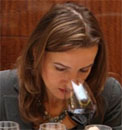 It was Elena Porman, managing director of The Moscow International Wine Expo (MIWE), who convinced Spurrier to come to Russia. While other wine celebrity Brits had accepted invitations to visit this country, at times more than once, Steven Spurrier, incredibly, had never walked on Red Square nor experienced the Russian wine scene before. It was Elena Porman, managing director of The Moscow International Wine Expo (MIWE), who convinced Spurrier to come to Russia. While other wine celebrity Brits had accepted invitations to visit this country, at times more than once, Steven Spurrier, incredibly, had never walked on Red Square nor experienced the Russian wine scene before.
The launch of MIWE, Russia’s first wine lifestyle event, coupled with the 35th anniversary of the Judgement of Paris, was a perfect occasion to introduce Spurrier to the Russians. And what could be a better way to do it than organise a tasting of Chardonnay and Cabernet Sauvignon that would evoke the spirit of the legendary Paris event?
The Judgement of Moscow was not a re-creation of the original tasting. Yet, it was clearly inspired by it and promoted the same idea – to give an equal chance for a fair assessment of wines from traditional and relatively new areas.
The event was divided into two tastings. Chardonnay wines were present on the first day, and Cabernet Sauvignon wines, including Cabernet-based blends followed the next day. Each tasting featured 10 wines. The selection was made by Spurrier from wines available in the Russian market and sold in the same price range.
Along with Spurrier, the panel of judges included 6 Russian experts and sommeliers, all well-known personalities on the local wine scene. They were Eleonora Scholes, Anton Panasenko, Pavel Shvets, Igor Serdyuk, Karina Sogoyan and Margarita Krasnopolskaya. The wines were tasted blind, and the judges used a 20-point scale as in the original 1976 tasting. An overall ranking was established according to the average grade of each wine.
Tasting open to public
The Judgement of Moscow was also open to the public who tasted the same wines. Spurrier invited the tasters in the audience to submit their individual lists of top 5 wines. All entries were further ranked by summing up the results for each wine. Thus, the intrigue of the Moscow Tasting was in having two rankings – an official one from the judges, and the second unofficial one as “the people’s choice”.
 After submitting their sheets but before announcing the results, the judges discussed the wines – something that wasn’t done in Paris 35 years ago. Some discussions were quite heated, especially with Chardonnay wines, that would at times yield opposite reactions from the judges. After submitting their sheets but before announcing the results, the judges discussed the wines – something that wasn’t done in Paris 35 years ago. Some discussions were quite heated, especially with Chardonnay wines, that would at times yield opposite reactions from the judges.
And the winners were... rather predictably, New World wines receiving top rankings in both the categories. In the Chardonnay tasting, Amelia Chardonnay 2008 by Concha y Toro from Chile was ranked first by the panel. Among Cabernet Sauvignon, it was Australian Coonawarra 2007 by Petaluma. The audience voted for 2009 Chassagne-Montrachet by Fontaine-Gagnard from Burgundy as their top Chardonnay, and Sondraia 2007 by Poggio al Tesoro in Bolgheri, Italy in the Cabernet category.
Comparing the results between the panel and the audience Steven Spurrier noted, “It is very clear that Moscow is a red wine city. The results between the two Cabernets are very close: the top three being the same, though in a different order and the bottom three being in the same order. For the whites, there was a great disparity, with agreement only on the Shaw and Smith and Fontaine Gagnard. My view is that the panel was a little more objective, thinking “is this a good wine”, whilst the audience, naturally was more subjective, thinking “do I like this wine”. Both views are quite valid, but I try and tell Decanter tasters to be objective. There is no reason why consumers should be”.
Overall results from the Moscow Tasting are shown below, but something to remember, in Spurrier’s words, “One thing is certain, as it would have been for the Judgement of Paris in 1976: the same wines with the same people the following day would not have had the same results!”
Eleonora Scholes
Moscow
 Eleonora Scholes is an award-winning wine journalist. She writes for numerous specialised and lifestyle titles in Russia and Ukraine. Her articles also appear in various European wine publications, including Meininger’s Wine Business International and The World of Fine Wine. She contributes to Hugh Johnson's Pocket Wine Book with a chapter on the Old Russian Empire. Eleonora’s marketing background and knowledge of the Russian market see her undertake a variety of consulting projects. Her bilingual website is www.eleonorascholes.ru. Eleonora Scholes is an award-winning wine journalist. She writes for numerous specialised and lifestyle titles in Russia and Ukraine. Her articles also appear in various European wine publications, including Meininger’s Wine Business International and The World of Fine Wine. She contributes to Hugh Johnson's Pocket Wine Book with a chapter on the Old Russian Empire. Eleonora’s marketing background and knowledge of the Russian market see her undertake a variety of consulting projects. Her bilingual website is www.eleonorascholes.ru.
Judgement of Moscow 2011 Results
|